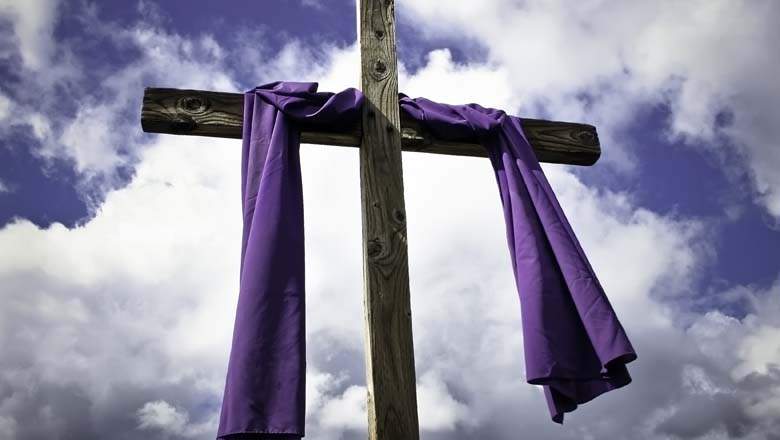This article was published in Flourish Newspaper, the Official Journal of the Catholic Archdiocese of Glasgow, Scotland. April, 2022, page 17.
One of the things that civilization and modern technology has done is widening paths. This has had a massive influence in the lives of the people, their preferences as well as choices. There are few narrow options left, and oftentimes these too have alternatives.
Narrow rough roads are made wider and smooth, staircases are replaced with lifts, and close family circles are widely replaced by distant virtual bonds. Individualism grows and glows daily, people feel less obliged to be kind, and are less moved to be compassionate.
The journey
The Lenten journey demands of us an attentive ear, an empty heart, a docile will, a patient body, and at the rock-layer of all these, a fervent, compassionate and faithful soul. This is the ideal at the heart of the teaching of Christianity. But it is more especially demanded of us in this Lenten pilgrimage as we deeply meditate on the greatest accomplishment of our ‘becoming’.
We speak of ‘becoming’ because that is what the Lord’s passion and death marks. It is the peak of our being made children of God. It is the long awaited turning point. We can borrow the terms ‘being’ and ‘becoming’ from the ancient philosophical debate, as they rightly serve the purpose of teaching us faith and life lessons in this time of Lent.
The Cross of Jesus which calls us to this commemoration every year is itself a testimony of great becoming, especially with the triumph at the resurrection of Jesus. George Maloney, S.J. makes a remark in his book ‘Prayer of the Heart’:
“The Cross was an instrument of degrading torture reserved for slaves and criminals. After the death of Jesus we could have expected that his first followers would want to forget about this part of the story … But the opposite happens.”

He continues, “The Lord who rose is the good news. And the cross on which he hung is celebrated in creed, liturgy, song, art and literature. Crosses are fashioned in wood, stones, and precious metals. They are raised high on buildings, they adorn altars and graves. They are carried in pockets, worn about the necks. Why? Because the human heart reads the Calvary scene correctly and understands that the theme of this drama is love and that we are objects of that love.”
At all times, God has a way of making his goodness known through the thorny, hard, and narrow paths that many fear to tread. Our ‘being’ is transformed with a continual steadfastness and faith in this forty days pilgrimage.
At the end of the forty days we will be assured of change because of the dutifulness we’ve imbibed during the journey. This change is the promise of the crown of resurrection with the Lord Jesus, as with the help of his grace we die to sin and rise to live uprightly.
Peaceful paths
Lent can be a very beautiful gift to oneself when one willingly chooses to denounce excesses, and sacrifices occasions of unrewarding pleasure and gain; when one chooses to think about the future life and make amends for good; when one disposes himself to the feelings of powerlessness, poverty and lack in order to help those who go through such lack, poverty, inadequacy, oppression and uncertainty on daily basis.
With this disposition we get to know that we so much need God as on our own we can neither find fulfillment nor accomplish anything. This will make us to pray more. St John Henry Newman teaches us that: “As our bodily life discovers itself by its activity, so is the presence of the Holy Spirit in us discovered by a spiritual activity; and this activity is the spirit of continual prayer.”
Inner tranquility is very important in our journey of faith. The world is full of distractions and preoccupations. There is always too much to listen to, to admire, to read, to watch, to taste, to feel, to follow, to like, to comment about, to share, to consume, and to experience. All these contribute to our anxieties, fears, insecurities, loneness and even spiritual dryness if we allow them.
With inner peace one gets to know that God does not give us a river, but each a brook which sometimes flows and sometimes dries up; all to teach us, as one author writes, “not to rest on the river, but on God himself.” St Augustine rightly said: “Our hearts are restless until they rest in you (God).”
Witnessing in Solidarity
Having sufficient material supply for the things we need often comes with a tempting feeling of of invincibility and over-confidence in the supply of the things we have. Our spiritual activities make more impact when we are attentive to the signs of the time and are moved to show solidarity with the suffering world.
With hearts fixed on the Lord we are able to transcend the myopic vision. It takes a leap of faith to choose the narrow path, and that is what the Lord wants of us, to have him always before us and in everything we do.
While the modern world speedily embraces a selfish way of living, we are called to be witnesses in genuine solidarity with the poor, the abandoned and marginalized, victims of war and indifference, the lonely, the sorrowful, the sick, the aged, the terminally ill, and all other people around us.
Lent calls on us to narrow down our priorities, to find time in our busy schedule to pray and pay forward the kindness we ourselves enjoy from God.
Br. Shimbo Pastory, C.S.Sp. is a member of the Congregation of the Holy Ghost (Spiritans) originally from the Spiritan Province of Tanzania, E.A. He is currently undertaking pastoral and mission work experience in the UK under the Spiritan British Province. He writes from Carfin, Motherwell.
